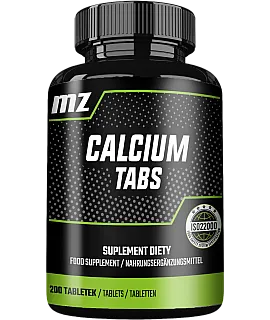Calcium in the diet

Calcium is the mineral that is found in the highest amounts in the human body, mainly in bones and teeth. Only 1% of body calcium is used to maintain normal homeostasis of the human body, while the remaining 99% of calcium is stored in bones and teeth. Calcium has many important physiological functions in the human body, which is why it is so important to have an adequate intake of calcium in the diet every day.
Calcium - properties
Calcium is characterized by multidirectional effects in the human body. Among its most important functions are:
- constriction and dilation of blood vessels,
- regulation of blood pressure,
- conduction of nerve impulses within the nervous system,
- contraction of skeletal muscles and the heart,
- bone and tooth formation,
- wound healing,
- reducing the permeability of cell membranes,
- activation of certain enzymes,
- release of hormones (e.g., insulin),
- activation of blood clotting factors (II, V, VII, IX, X, von
Willebrand).
Calcium protects against loss of bone mass and reduces the risk of bone fractures
It is well known that calcium is essential for proper bone formation. Hence, regular dietary intake of calcium-rich foods is widely recommended to maintain a healthy skeletal system throughout life and reduce the risk of low-trauma fractures. Besides, achieving the highest possible peak bone mass and maintaining it over a long period of time is particularly important in terms of osteoporosis prevention. An adequate supply of calcium in the diet is therefore beneficial for any age group, however, especially for children and adolescents, in whom the development of bone mass occurs very intensively. Food products rich in easily digestible calcium are beneficial for growth and bone mineralization in children and adolescents, and play an important role in preventing osteoporosis and bone fractures in the elderly.
Calcium may reduce the risk of developing many chronic diseases
The literature suggests that adequate dietary calcium intake may play an important role in both preventing and supporting the treatment of a wide variety of chronic conditions, such as obesity, type 2 diabetes and cancer (mainly breast cancer, colorectal cancer and prostate cancer). An adequate dietary calcium supply is also crucial for pregnant women, as it is associated with a reduced risk of developing pre-eclampsia. In addition, adequate dietary calcium intake can lead to a lower risk of lead poisoning, due to the fact that calcium reduces the absorption of lead from the gastrointestinal tract and can prevent the release of lead from stores stored in the bones. Consuming high amounts of calcium with the diet may also reduce the severity and frequency of premenstrual syndrome symptoms (including mood disorders) in women of childbearing age. Dietary calcium may also slightly reduce the risk of developing high blood pressure.
Calcium - can it reduce body weight?
In vitro and in vivo studies have found that calcium, as an essential mineral component of the human body, exhibits many biological properties and may play an important role in hormone secretion, glycogen metabolism, as well as the proliferation and differentiation of adipocytes, i.e. fat tissue cells. Studies have shown that a high intake of calcium in the diet (mainly from milk and dairy products) or dietary supplements has only a small effect on body weight, while it can contribute to an increase in lean body mass, fat reduction and a decrease in waist circumference. Among the mechanisms of action responsible for the potential anti-obesity effects of calcium are:
- decreasing lipogenesis and increasing lipolysis,
- enhancement of adipocyte proliferation,
- inhibiting absorption and increasing fecal excretion of fats,
- stimulation of fatty acid oxidation,
- improving insulin sensitivity,
- enhancement of thermogenesis with an increase in brown tissue activity
adipose tissue, - modification of the composition of the gut microbiome.

Calcium - sources in the diet
Dietary calcium is mainly found in milk and dairy products. Yellow cheeses (e.g., Parmesan, Gouda, Edam, Cheddar, Emmentaler), blue cheese (e.g., Brie, Camembert), Mozzarella cheese, Feta cheese, milk, yogurt, kefir, buttermilk are excellent sources of well-absorbed dietary calcium. People who, for certain reasons, limit the intake of milk and milk products (such as established lactose intolerance or allergy to cow's milk proteins, or adherence to a vegan diet) can turn to other quite good sources of dietary calcium. These include: sardines, sprats, pulses (e.g. white beans, soybeans), green vegetables (e.g. broccoli, Chinese cabbage, parsley, spinach and kale), dried fruits (e.g. figs, apricots), nuts (e.g., hazelnuts, walnuts, pistachios), almonds, seeds (e.g., sesame, poppy and sunflower seeds), pumpkin seeds, tahini, amaranth, and calcium-fortified foods (e.g., tofu, sugar-free vegetable drinks - including soy). Dietary calcium can also be provided from highly mineralized waters, as its bioavailability is almost identical to that of calcium from milk and milk products.
Sources:
- Jarosz M, Rychlik E, Stoś K, Charzewska J. (eds.): Norms of nutrition for the Polish population. National Institute of Public Health - National Institute of Hygiene. Warsaw 2020.
- Geng T., Qi L., Huang T.: Effects of Dairy Products Consumption on Body Weight and Body Composition Among Adults: An Updated Meta-Analysis of 37 Randomized Control Trials. Mol Nutr Food Res. 2018 Jan;62(1).
- Mena-Sánchez G., Becerra-Tomás N., Babio N., et al: Dairy Product Consumption in the Prevention of Metabolic Syndrome: A Systematic Review and Meta-Analysis of Prospective Cohort Studies. Adv Nutr. 2019 May 1;10(suppl_2):S144-S153.
- Gonzalez J.T., Rumbold P.L., Stevenson E.J.: Effect of calcium intake on fat oxidation in adults: a meta-analysis of randomized, controlled trials. Obes Rev. 2012 Oct;13(10):848-57.
- Cormick G, Belizán JM: Calcium Intake and Health. Nutrients. 2019 Jul 15;11(7):1606.
 ⮜ Previous article
⮜ Previous article
What to eat after weight training?
 Next article ⮞
Next article ⮞

